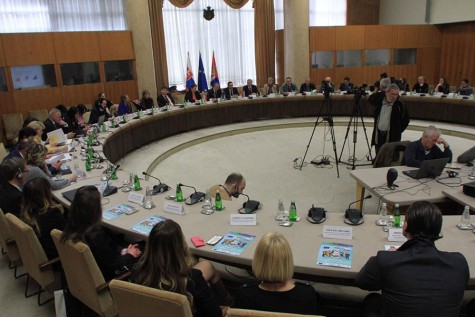The EU Delegation and the Ministry of Labour, Employment, Veterans and Social Affairs with the representative social partners today marked the end of a 25-month twinning project ‘Promoting Social Dialogue’. The EU has donated € 1,5 million for this project helping to strengthen and improve the quality of social dialogue in Serbia.
The project final event was held on Friday, March 11th, 2016 in the premises of „Palace of Serbia“ in the presence of Mr Aleksandar VULIN, Minister of Labour, Employment, Veteran and Social affairs, Mr Michael DAVENPORT, the Head of the EU Delegation to Serbia, Ms Dagmar REPČEKOVA, the Slovak Ambassador to Slovakia, Mr Zoran MIHALJOVIĆ, the Secretary of the Council, Confederation of Autonomous Trade Unions of Serbia, Mr Branislav ČANAK, President of the Trade Union Confederation NEZAVISNOST and Mr Nebojša ATANACKOVIĆ, President of the Serbian Association of Employers.
In the framework of the EU accession process it is of great importance for Serbia to harmonise labour legislation, policies, procedures with the EU standards to fulfill the future member state obligations in the field of labour legislation and strengthening the social dialogue.
In order to help Serbia to achieve this goal, Slovakia was involved in this institutional twinning project with their Serbian counterparts. More than 35 experts have shared their knowledge, experience and best practices with their Serbian colleagues from the Ministry of Labour, Employment, Veterans and Social Affairs, the representative social partners and the Local social economic councils as well.
Photo: FoNet
The project has strengthened the legal capacities of the Labour Department of MoLEVSA and social partners to further align the labour legislation with EC Directives related to working time and leave, flexible models of employment, protection of workers in event of collective redundancy, employer insolvency, protection of young people at work, equal treatment of men and women in employment, etc.
More than 30 activities have been jointly implemented conveying concrete results. On the national level, the key steps of the accession process in the area of labour and collective relations have been supported: Serbian labour legislation compliance with the EU Directives is ready to be further implemented; effective mix of policies to reduce the rate of informal economy and actions to promote work in formal economy was set up; the issue of the representativeness and registration of the trade unions and employers’ association, respecting the ILO Convention, was simplified and barriers preventing the local social partnership are ready to be adopted. Regarding the local level, 28 local social economic councils are fully operational and functional and are able to design local action plans addressing the local problems and needs; they are also better skilled on the different issues of social dialogue and collective bargaining, on how to fundraise social dialogue activities and how to apply to IPA and EU schemes to finance local partnership’s activities.





